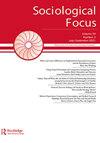Habits of the Millennial Heart: Individualism and Commitment in the Lives of Young, Underemployed Americans
Q2 Social Sciences
引用次数: 1
Abstract
ABSTRACT This article presents an exploratory mapping of millennial individualism. In doing so, it complicates the common popular and scholarly narrative that millennials as a generation are less committed to the broader social order. Instead, drawing from recent advances in the study of American culture, I show that millennial individualism can be compatible with extra-individual commitment. Analyses draw from in-depth interviews with a sample of underemployed millennials regarding their experiences with work and education, as well as their future orientations and life goals. Findings demonstrate that respondents relate to the broader social order using three styles of millennial individualism – self-realization, reflexive moralism, and utilitarian traditionalism. While the sample does not allow for generalization to the entire generation, the findings presented here demonstrate the clear potential of millennial individualism to translate into traditional institutional milestones, higher life purposes, and the greater good. Respondents with backgrounds from across the social class spectrum draw from individualistic discourses to construct an array of extra-individual commitments. Nevertheless, those from working-class backgrounds are more likely to orient their lives around the attainment of traditional milestones. In demonstrating how a group of millennials actually think about their lives in relation to society, findings suggest that millennial orientations may represent the latest iteration of American individualism rather than a break from the traditional social order.《千禧一代心灵的习惯:未充分就业的美国年轻人生活中的个人主义与承诺》
本文对千禧一代的个人主义进行了探索性的描绘。这样一来,人们普遍认为千禧一代对更广泛的社会秩序不那么投入的观点和学术观点就变得复杂了。相反,根据美国文化研究的最新进展,我表明,千禧一代的个人主义可以与额外的个人承诺相容。分析来自对未充分就业的千禧一代样本的深度访谈,内容涉及他们的工作和教育经历,以及他们的未来方向和生活目标。调查结果表明,受访者使用三种千禧一代个人主义风格——自我实现、反身性道德主义和功利主义传统主义——来联系更广泛的社会秩序。虽然样本不能推广到整个一代人,但这里提出的研究结果表明,千禧一代的个人主义有明显的潜力,可以转化为传统的制度里程碑、更高的生活目标和更大的利益。来自不同社会阶层背景的受访者从个人主义话语中汲取经验,构建了一系列额外的个人承诺。然而,那些来自工薪阶层背景的人更有可能将他们的生活定位在实现传统里程碑的周围。在展示千禧一代如何看待自己与社会的关系时,研究结果表明,千禧一代的取向可能代表了美国个人主义的最新版本,而不是对传统社会秩序的突破。
本文章由计算机程序翻译,如有差异,请以英文原文为准。
求助全文
约1分钟内获得全文
求助全文

 求助内容:
求助内容: 应助结果提醒方式:
应助结果提醒方式:


